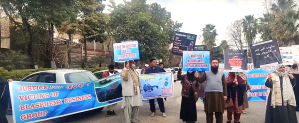
Efforts to curb abuse of Pakistan’s controversial blasphemy laws suffered a major setback on Thursday (July 24) when judges suspended a prior court order to form a commission to investigate misuse of the harsh laws, sources said.
The division bench of the Islamabad High Court (IHC) comprising Justice Khadim Hussain Soomro and Justice Mohammad Azam Khan issued the stay order after hearing preliminary arguments on appeals filed by leaders of a “blasphemy business group” challenging the July 15 ruling of IHC Justice Sardar Ejaz Ishaq Khan.
Attorney Kamran Murtaza, representing the “blasphemy business group,” reportedly argued that the petitioners were not granted a full right to a hearing and raised concerns over jurisdiction, noting that the matter involved around 400 cases, some beyond the IHC’s jurisdiction.
Murtaza, who is also a member of the Senate of Pakistan from the rightwing Islamist party, Jamiat Ulema-e-Islam (JUI-F), also questioned the legal authority of the court to form such a commission, arguing it rested solely with the federal government.
Following the initial hearing, the high court reserved judgment on the appeal but suspended the single bench’s order for 30 days.
The suspended single-bench order was part of a nine-page, detailed judgment by Justice Sardar Ejaz Ishaq Khan, following 42 hearings in 101 petitions filed by families of victims of the blasphemy business gang, seeking formation of an inquiry commission.
The court had directed the federal government to establish an inquiry commission within 30 days after startling revelations that individuals, including some Christians, were trapped through doctored digital content, coerced into confessions or falsely accused of blasphemy to extract money or settle personal scores.
Noting that nearly 400 First Information Reports (FIRs) and about 700 suspects were linked to online blasphemy cases, the judge underscored the need to investigate the alleged blasphemy business group and the Federal Investigation Agency’s (FIA) failure to conduct proper forensic analysis and procedural irregularities, including private arrests, unverified digital evidence and the same Facebook IDs being reused in multiple FIRs.
The court had noted that some FIRs were registered and investigated on the same day, violating FIA’s own standard operation procedures. Most alarming were reports of four custodial deaths of blasphemy suspects, with one video showing signs of torture, and no judicial or administrative inquiry conducted in these cases.
Concluding that the issue was of “definite public interest,” the court had justified the formation of a commission as necessary to ensure transparency, accountability, and the protection of fundamental rights.
It directed the federal government to form a four-member commission comprising a retired judge, a senior FIA officer, a respected religious scholar, and a cybercrime expert. The commission was to submit a comprehensive report within four months, and all proceedings were to be broadcast live to ensure transparency.
Backlash from Islamists
Justice Ejaz Ishaq’s decision sparked immediate backlash.
Several hardline clerics and religious groups openly rejected the order to form a commission, labelling it “un-Islamic” and attempting to stir public sentiment against the judiciary.
Through sermons, social media campaigns and public statements, they urged their followers to challenge the court’s authority, portraying the initiative as an attack on Islamic values and warning the government against implementing the decision.
The pressure and legal appeals led to suspension of the ruling by the two-member division bench, which halted the commission’s formation pending further proceedings, said a Christian rights advocate.
“Hafiz Saad Rizvi, chief of the extremist religio-political party, Tehreek-e-Labbaik Pakistan (TLP), publicly criticized Justice Ejaz Ishaq’s ruling,” said the advocate, whose name is withheld for security reasons. “He also threatened the judiciary by making references of high-profile cases such as that of Mumtaz Qadri, the assassin of former Punjab Gov. Salmaan Taseer, to stir public sentiment and rally opposition against the formation of the judicial commission.”
The supreme leader of the JUI-F, Maulana Fazlur Rehman, and the Lahore High Court Bar Association also openly opposed the court’s decision and warned Justice Ejaz Ishaq Khan to withdraw the order, threatening severe consequences if he did not, the advocate said. Attorneys and activists supporting the victims’ families were also threatened with violence, he added.
“With the suspension of the commission order, the future course of the case is now uncertain,” he said. “However, the case has raised serious questions about the use of blasphemy laws, judicial authority and the role of religious influence in legal processes. We are now looking at the court and the government to see how they respond to the appeals.”
A Christian lawyer who has represented several victims of alleged blasphemy told Christian Daily International-Morning Star News that Justice Ejaz Ishaq’s order had offered a glimmer of institutional courage.
“The fact that some Muslim lawyers pursued this case despite grave personal risk – and that the judge himself chose to touch this volatile issue – speaks volumes about the kind of moral clarity that is too often missing from our justice system,” said the lawyer, whose name is withheld for security purposes. “Through the live proceedings, the people have seen firsthand how allegations of blasphemy are used as political and personal weapons and its consequences.”
The suspension of Khan’s order by a division bench of the same court, however, is as disturbing as it is dangerous, he said.
“The suspension of the order has sent a chilling message to victims, rights advocates and honest public servants that even in the face of overwhelming evidence and public interest, the system would rather look away than confront the issue,” he lamented.
The attorney emphasized that the justice system must not now allow its action or inaction to help shield those who exploit religious sentiments for power, profit or politics.
“Pakistan cannot afford yet another lost opportunity to safeguard its citizens from persecution,” he said. “Justice was finally being given a fighting chance, but suspending it now serves no one but the predators. The state must ask itself whose interests are being protected by halting a fact-finding mission into a matter of life and death? If we cannot investigate the truth, we cannot claim to uphold justice.”
Pakistan ranked eighth on Open Doors’ 2025 World Watch List of the most difficult places to be a Christian.






